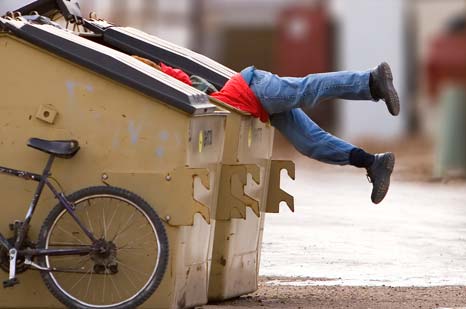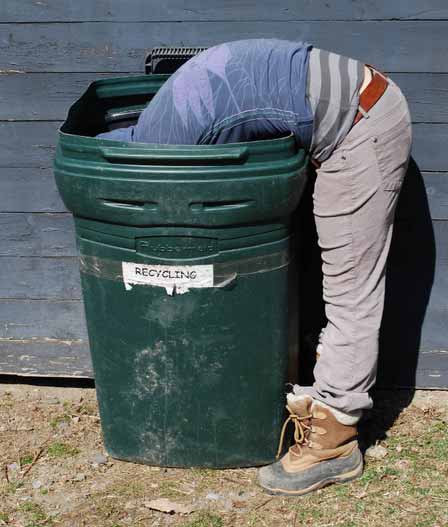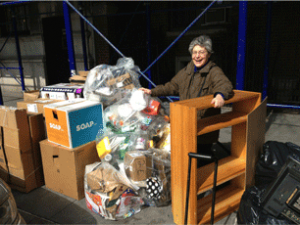These days the term “Lean In” is getting a lot of traction due to Sheryl Sandberg’s book of the same name, but in my case it means dumpster diving, head first. I can’t pass a garbage dumpster without sticking my head and most of my torso in. Usually I find something irresistible.
More Than One Way to Dumpster Dive for Food
At the end of my shared driveway is a recycling bin that’s a constant source of useful flotsam like empty ice cream cartons that can be turned into flats to start seeds, glass pickle jars that make ant-proof food storage containers, egg cartons to hold and give away our own chickens’ eggs, juice jugs that can be transformed into sap buckets and attached to one of the sugar maples in our yard. Whenever I pass the recycle bin on foot, headed to the park for a jog, its siren song compels me to flip open the top and insert myself at the waist.
After a small dinner party at my mom’s apartment in D.C., I pulled from her kitchen trash an avian feast: a baked potato, beet peelings, salad greens and cantaloupe rinds, plus a container of spoiled sour cream. “Really? You’re going to take that all the way home?” Even my mom, the notorious family pack rat, was surprised. “Do not forget it in my fridge.”
Dumpster Diving in the Lunchroom at Work
I put a garbage can in the lunchroom at work specifically for food scraps for aforementioned chickens. At the end of the day, if no one’s in the lunch room, I sift through the main garbage for apple cores and bread crusts that didn’t make it into the food scraps bin. It doesn’t exactly enhance my professional image to be rooting around in my co-workers’ soggy half sandwiches, I admit. I haven’t quite figured out what “leaning in” means but I don’t think it’s supposed to be this literal. Husband Joe has developed garbage-vision in step with mine. He calls it “a different level of consciousness.” He’s been re-using squares of tinfoil, saran wrap, the bags from cereal boxes, even the oil left over after making home fries, which he served in a saucer at breakfast recently. “Seems a shame to waste it,” he said, as we dutifully swirl forkfuls in the viscous orange liquid.
Pope Francis: An Avid Waste Hater
A Buenos Aires newspaper reported that every month Jorge Bergoglio, better known now as Pope Francis, returned 30 rubber bands from the daily newspapers that were delivered to his house to the kiosk whence they came. The pioneering farmer, Mark, who became the subject of the memoir The Dirty Life, kept a ball of used dental floss, in case someday he had to sew up a hole in his pants. Angry environmental activist Derrick Jensen spent nine years dumpster diving foodstuffs like watermelons and expired ice cream that he fed to himself, his cats, dogs and chickens.
Side Effects of Dumpster Diving for Dinner
A constant awareness of what’s being tossed can be wearing. Side effects include depression, disgust, despair, empathy with the Unabomber. Part of me wishes I could go back to tuning out the pile of “obsolete” electronics (obsolescence is relative. I’ve seen flat-screen TVs in there) that I drive past on my way to work. How the single village of Florida, NY, can excrete an endless stream of televisions, printers, scanners, and fax machines is a question that plagues me.
Still our ranks continue to grow. The morning after her dinner party, my mom was slicing up the remainder of the cantaloupe for breakfast. “The chickens love cantaloupe rinds?” she said, opening the fridge to put sections of rind into the bag of scraps that I was going to take home. “You feed them this and you get eggs,” she said. “I’m getting it.”
This post is adapted from Dirt magazine, a sister publication of NYPress, January 24, 2014






Becca,
I really identify with this article. I must say I don’t think I ever ‘dove’ for dinner — though I have picked up the occasional piece of wrapped gum or candy on an airport floor — but I recently attended a “Salvage Dinner” hosted by a student doing a masters thesis at School of Visual Arts’ Design for Social Innovation program. It was amazing! So many dishes made from fruits and veggies salvaged from Whole Foods, Trader Joes, local green market, etc. and whipped up into gourmet meals.
Between Salvage Suppers and dumpster diving, — and a tradition I’d like to see get started in America ‘Pot Luck Sunday’ – so many of us can stretch our food budgets beyond imagine and make sure not a morsel goes to waste!
This story is either done tongue in cheek, or tongue in the dumpster behind the Carnegie Deli, or is totally disgusting and in that case someone just had the courage to say so. Even feeding chickens, let alone humans, from dumpster scraps, from which contaminants can enter the food chain, is dangerous. And every serious waste hater, unlike the author, should know the difference between what the author describes as “flotsam” and jetsam and the proper grammatical usage of those terms.
Mark,
I think the important thing to keep in mind is not the prospect of literally diving in the dumpster for dinner (which of course some people do — and I have learned find perfectly edible, totally wrapped food that was thrown out likely before it’s time because of a sell by date that may have nothing to do with actual food product safety (We’re readying a post on this topic, stand by for details.), BUT as a metaphor for diverting food that can be consumed by humans or animals before it winds up in a landfill and not only creates methane but takes with it any number of embodied resources like water and energy.
I have been to a few events in NYC of late and the hosts ‘ecologically’ provided large Ziploc bags for use by the guests to bring home uneaten food from the buffet. I enjoyed the canapes and sandwiches all the more the next day knowing they were spared from trash — and also save me some cash. (Food prices in NYC are high enough thanks.) Hopefully, the creativity and courage displayed by the author will inspire others to act in the ways that make them comfortable.
BTW, thanks for getting me curious about the difference between jetsam and flotsam. Am including this helpful link for anyone who may be curious and need a refresher as well:
http://oceanservice.noaa.gov/facts/flotsam-jetsam.html
I am with Becca on the food scrap front. I honestly cannot stand the idea of good food going to waste, literally. Hail to those chickens!
I will admit, though, going back in time, I was a little grossed out when my friends in Boston told me that they had been routinely scavenging for food in the dumpster behind Trader Joe’s. This was almost 20 years ago, before it became ‘cool’ to dumpster dive. What I didn’t realize was that the food they gathered was ALL packaged. I imagined them untangling hairs from and scraping grime and grease off of bare pieces of bread to make a sandwich. But we are talking hundreds of packages of edible food routinely thrown away whose only crime was an arbitrary ‘expiration date’ stamped on the side.
For a behind-the-scenes glimpse into feeding off of supermarket waste, please see this film, “Dive!” (http://www.divethefilm.com/). Another documentary examining and offering solutions to the massive food waste problem is “Just Eat It” (http://www.foodwastemovie.com/).
But Becca’s story is about more than just food. What some people define as waste or recyclable can be a goldmine for other people who happen to be in the market for that item, either using it in its current form or repurposing it. Maybe it’s a symbiotic thing. We need people to waste so that we can scavenge for usable stuff.
I will never forget going to the ‘dump’ in Westport, CT and watching with horror as people wildly threw books and furniture into the incinerator ‘pit.’ It was almost sinister and the image haunts me to this day. I stopped a lady in mid-hoist. She was about to trash an entire outdoor wicker patio set and I asked her, “Why aren’t you donating this stuff to the thrift store?” Her answer? She didn’t have time. Guess who ended up taking all of that furniture home in the family station wagon?
Thank you for writing this piece Becca.
I love the pics of you leaning in 🙂
Food Shift is currently in the midst of food waste awareness week at Airbnb – we designed a whole program with educational materials, tips, a weigh station in the cafeteria and tonight we’re showing the film Dive!
After rescuing food from dumpsters for 5 years its so difficult to go to the store and buy bread, potatoes or other produce. I love cooking and as the result of a once per month mission to a few stores we’re able to remain fully stocked (other than butter, cheese, nuts, oils and garlic) to feed our household and friends for an entire month. It’s amazing how little we spend on food and how delicious and rich our culinary life is!
The dumpster diving is an emotional roller coaster as you described. While its exciting to find free food, I am so frustrated each time I bring home 300-500 lbs of food that could have been redistributed.
That is why Food Shift is working so hard to build a more sustainable food recovery operation in the Bay Area and beyond. I’d love to talk with you more about our approach. Find out more at http://www.foodshift.net
Thanks again!
Dana
My grandmother, who was from a small farming village outside Hungary and lived to almost 100 always said, “honey, its a sin to waste food”. They didn’t have much. So I get the tragedy of food waste. However, dumpster diving for edible food off someone’s table may call attention to the problem like William Rathje the garbologist did in the early 1990’s by digging up landfills. But eating scraps I just can’t condone. One of the first things I did for recycling when I founded the environmental program at Home Depot was to get all the store managers together at a recycling center and have a few of the stores’ trash compactors emptied, the contents of which we then separated ourselves. I can imagine emptying out a dumpster snd seeing packaged food that might still be good, even if beyond an expiration date. Right now, the legislation about food waste seems to be aimed at source separation for composting, but if there’s anything I think we might agree on is that perhaps legislation should go after discarded packaged food, but leave table scraps alone in the dumpster. It may be a sin to waste food, but its worse to endanger someone’s health or life.
Hey all,
Great reading in this comments section. As to worries about food contamination: All I can say is I haven’t gotten sick yet from any scraps I’ve taken out of the trash — and I did spend three days eating exclusively dumpster dived (dove?) food for a newspaper story. (Meanwhile, I’ve gotten food poisoning twice from restaurants.) As disconnected as we’ve become, we still have our instincts: smell, sight, taste. But this story is not so much about dumpster diving for food for myself as it is about finding other usable stuff in the trash, as well as food for my chickens. Chickens, back in the homesteading/pioneering days, were fed exclusively from what the people didn’t eat. There was no such thing as buying feed at the store. Chickens know what they like and what they don’t, and they’ll leave anything they don’t like alone. In fact, I’m off at this very moment to pick up restaurant scraps to feed my girls. Cheers.
I appreciate the dialogue on the topic. However, I am with Mark on this. The notion of “dumpster diving”, while it may be a practical exercise for some items, represents too much of a health risk relative to food – and is just plain gross.
I believe the solution lies in more pressure on retailers for them to invest in technology and develop better engineered supply chains. Better said – the food should not get to a dumpster in the first place. Retailers should use smart inventory technology to ensure that all items in stock are sold, and those non-perishables that still have viability and economic value are maximized. Throwing out food is throwing out money.
Through smarter and more efficient kitchen-prep practices, we can ensure all food is being used (soup stocks, etc) or that scraps are composted… but digging through garbage bins, only to get cut on glass, pick up an illness through cross-cantamination, etc. – I’ll pass.
Great point, Chris. I agree that retailers need to take more responsibility to reduce food waste in the first place. Technology can definitely be a key component of that solution. The organization I recently started volunteering with, Food Shift, is actually working to engage businesses to minimize their food waste and thereby save them money. Since some surplus food is inevitable at these businesses given current stringent food safety laws, however, we are also working to utilize technology to connect any of their excess food to organizations that need it (ex: CropMobster website, etc.). Please feel free to check out our website to learn more! http://foodshift.net/.
Thanks!
Hanna
Americans throw enough food into landfills each year to feed the entire country! The amount of edible whole food that is thrown into dumpsters is remarkable and speaks largely to the fast-paced, disposable nature of the consumer culture in the United States. Dive!, a documentary by Jeremy Seifert follows people who get all of their food from dumpster diving. They find whole egg cartons that are thrown away because one was cracked, and entire steaks thrown away in the packaging because they were passed the designated expiration date. Although many people may not be quick to sign up to receive all of their food from dumpsters, the people in this film shed a bright light on the need to reduce food waste in this country. If you haven’t seen it, you should definitely check it out!
This informative article makes you closely examine what you actually throw out. I was part of a green organization at my University where every year on Earth Day the students would go through all of the trashcans on campus and create a giant tower of all of the materials and objects that could have been recycled. Every year we ended up with a grotesquely large tower of items that would have gone un-recycled and sent instead to a landfill sitting in the middle of our academic quad. I completely understand the sickening and angry feelings that arise when you see blatant wastefulness. I have never “dumpster dove” for food, but I think this article, like my school’s giant tower of recyclables, makes you question everything you are throwing out. I plan on proposing to my university that it add a second pile for just wasted food. I think that all too often when you hear about wastefulness and trash, you think primarily just about recycling. However, this article highlights the importance of reducing food waste and how mindless throwing out food can be.
I’m with you, Aria. Visualizing one’s waste is an excellent way to communicate and motivate. I think that’s why packaging is such a big target of consumers — they can see the bottles overtake their trash cans. At the University of Vermont, the first year Env Studies students are required to wear a trash bag on their belts for a day — of course, to see how fast the trash piles up. Makes a big impression for sure!
Love this post. I live in a bottle bill state (California) and whenever I see bottles and cans on the side of the road I mutter to myself, “You guys, that’s a nickel or a dime! I’ll take it if you won’t!”
I’ve gone diving to the bottom of my kitchen garbage bag for a wrapped twinkie that I threw out the night before, actually stuffed to the bottom of the bag as a supposed deterrent; in a fit of pique at my failed diet.. does that count ? 🙂
Pingback: Taking the Plunge | On DUMPSTER DIVING
Reading this post and the comments that followed it were truly inspiring. I recently watched the documentary “Just Eat It” and was shocked to find that the couple that underwent the experiment gained about 10-15 lbs (can’t remember exactly). I can’t help but wonder how much food insecure populations would benefit from having foods wasted both at the producer and retail level reallocated to these communities, especially healthy and fresh produce. If the legislation actually benefitted the prevention of food waste, the US, Europe and other countries, like Brazil, would stop wasting close to 50% of its food. Yet agricultural producers and supermarkets can take a huge step in this direction and prevent food waste, either by selling imperfect produce or products close to the sell by/use by date for cheaper or by simply donating them. We’ve a long way to go, but the important thing to do is to disseminate the message and contribute to educating and advocating for this cause!
Pingback: The Future of Food is in Other People’s Trash – WALL-EAT
Your article on the benefits of dumpster diving was amazing! I am so glad that people are finally starting to realize how wasteful our society is. Your insights gave me a lot of good ideas for my blog. Thank you very much for sharing your thoughts with us and if you have any other interesting findings please share them with me!